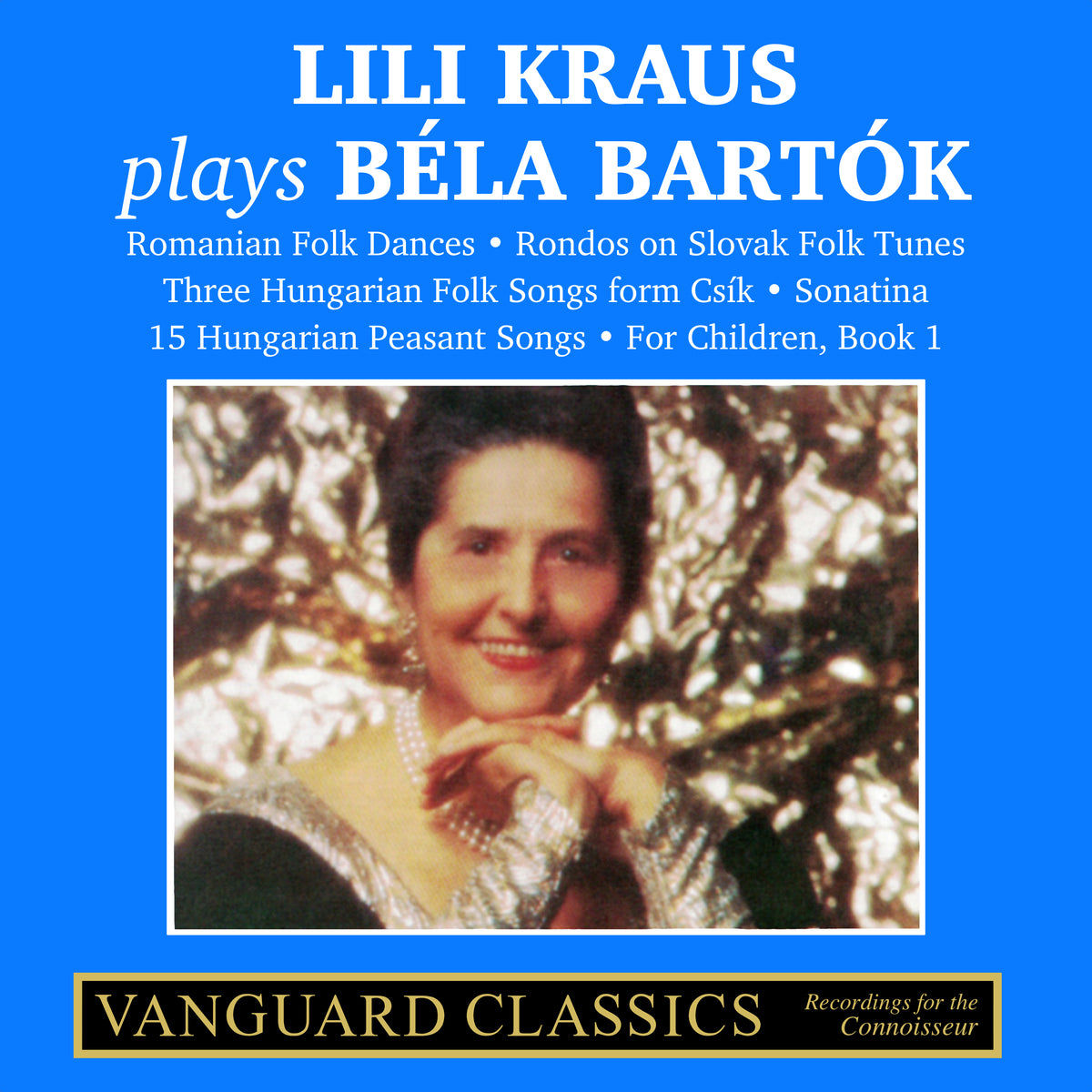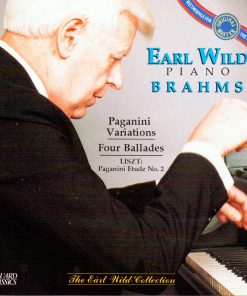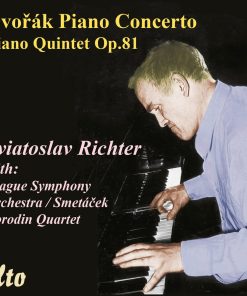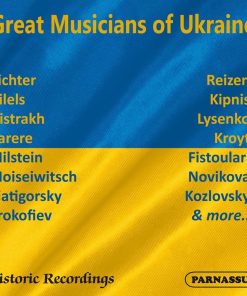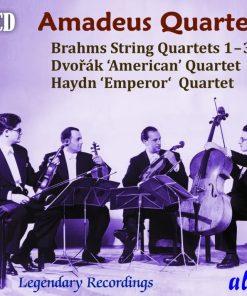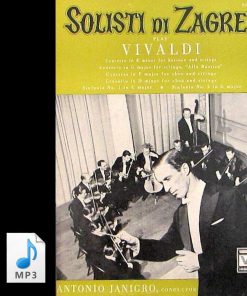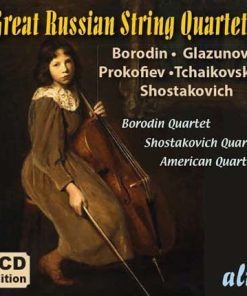LILI KRAUS PLAYS BELA BARTOK (Digital Download) VANGUARD CLASSICS
$ 4,99 $ 2,99

Romanian Folk Dances, Sz. 56, BB 68
1 No. 1. Stick Dance 1:04
2 No. 2. Sash Dance 0:32
3 No. 3. In One Spot. Andante 0:46
4 No. 4. Horn Dance 0:43
5 No. 5. Romanian Polka. Allegro 0:33
6 No. 6. Fast Dance 1:01
Rondos on Slovak Folk Tunes, Sz. 84, BB 92
7 No. 1. Andante 2:49
8 No. 2. Vivacissimo 2:39
9 No. 3. Allegro molto 2:48
Three Hungarian Folk Songs form Csík, Sz. 35a, BB 45b
10 No. 1. The Peacock 1:29
11 No. 2. At the Jánoshdia fairground 1:07
12 No. 3. White lily 0:58
Sonatina, Sz. 55, BB 69
13 1. Bagpipers 1:25
14 2. Bear Dance 0:48
15 3. Finale 2:02
15 Hungarian Peasant Songs, Sz. 71, BB 79
16 No. 1. Four Old Tunes – Rubato 1:03
17 No. 2. Four Old Tunes – Andante 1:46
18 No. 3. Four Old Tunes – Poco rubato 0:35
19 No. 4. Four Old Tunes – Andante 0:42
20 No. 5. Scherzo 0:49
21 No. 6. Ballad 1:03
22 No. 7. Old Dance Tunes – Allegro 1:33
23 No. 8. Old Dance Tunes – Allegretto 0:47
24 No. 9. Old Dance Tunes – Allegretto 0:35
25 No. 10. Old Dance Tunes – L’istesso tempo 0:44
26 No. 11. Old Dance Tunes – Assai Moderato 0:43
27 No. 12. Old Dance Tunes – Allegretto 0:28
28 No. 13. Old Dance Tunes – Poco più vivo 0:32
29 No. 14. Old Dance Tunes – Allegro 0:30
30 No. 15. Old Dance Tunes – Allegro 1:29
from 10 Easy Pieces, Sz. 39, BB 51
31 No. 5. Evening in Transylvania 2:40
For Children, Sz. 42, BB 53, Volume 1
32 No. 1. Children At Play 0:25
33 No. 2. Children’s Song 0:50
34 No. 3. Quasi adagio 0:46
35 No. 4. Pillow Dance 0:39
36 No. 5. Play 0:56
37 No. 6. Study for the Left Hand 0:42
38 No. 7. Play Song 0:32
39 No. 8. Children’s Game 1:27
40 No. 9. Song 0:58
41 No. 10. Children’s Dance 0:36
42 No. 11. Lento 0:56
43 No. 12. Allegro 1:12
44 No. 13. Ballad 0:50
45 No. 14. Allegretto 0:31
46 No. 15. Allegro moderato 0:35
47 No. 16. Old Hungarian Tune 0:40
48 No. 17. Round Dance 1:03
49 No. 18. Soldier’s Song 0:58
50 No. 19. Allegretto 0:35
51 No. 20. Drinking Song 0:33
52 No. 21. Allegro robusto 0:50
I was blessed by the privilege and joy of having been taught by
Béla Bartók. I remember, as if yesterday, that during one of my
lessons, he said in his taciturn, almost reticent, but incontestably
authentic way that “there is no other medium through which the
Hungarian genius is as strongly manifest as in the Hungarian
folklore.”
This deep conviction drove him towards passionate and
indefatigable efforts, and thus, with his like-minded friend Zoltán
Kodály, he set out on endless trips both in Hungary proper and the
territories attached to Hungary at that time. It is thanks to their
relentless work that they collected thousands of songs and dances,
freeing them from all unauthentic elements, restoring them to their
original essence. While Kodály’s harmonization of the Hungarian
tunes, though beautiful, remains close to the Classic-Romantic
European tradition, Bartók succeeds in giving the songs their
inherent virility, passion, and tenderness through his harmonic
invention and daring.
The impact that his person and his playing made on me was
matched by his way of teaching. Like Indian gurus, as often as not
he remained silent after you played, in like fashion to guru and
disciple sitting in congenial silence after the disciple has stated his
question. Bartök’s musical and spiritual emanation was so strong
that many a time without his saying a word about your
performance, critical or encouraging, you repeated the piece and
nobody understood why the interpretation was so different from
that of the first time. Your artistic vision changed through Bartok’s
intense listening.
I was a child (eleven years of age) when I first saw him. Then, as in
the last moment when I saw him in Italy, I found him the most
beautiful, transcendental, almost saintly human being I had ever
seen. I think that his vigilant integrity, along with his ever-ready
compassion shining from his wonderful dark eyes, enlightened us
to the infinite scope of his being.
— Lili Kraus, 1980
| CHOOSE YOUR DIGITAL DOWNLOAD FILE FORMAT | MP3, FLAC, APPLE LOSSLESS, WAV |
|---|
Fast Shipping and Professional Packing
Due to our longstanding partnership with UPS FedEx DHL and other leading international carriers, we are able to provide a range of shipping options. Our warehouse staff are highly trained to pack your goods exactly according to the specifications that we supply. Your goods will undergo a thorough examination and will be safely packaged prior to being sent out. Everyday we deliver hundreds of packages to our customers from all over the world. This is an indication of our dedication to being the largest online retailer worldwide. Warehouses and distribution centers can be located in Europe as well as the USA.
Orders with more than 1 item are assigned processing periods for each item.
Before shipment, all ordered products will be thoroughly inspected. Today, most orders will be shipped within 48 hours. The estimated delivery time is between 3-7 days.
Returns
The stock is constantly changing. It's not entirely managed by us since we are involved with multiple parties such as the factory and our storage. The actual stock can fluctuate at any time. Please understand it may happen that your order will be out of stock when the order is placed.
Our policy is valid for 30 days. If you haven't received your product within 30 days, we're not able to issue either a return or exchange.
You are able to return a product if it is unused and in the same condition when you received it. It must also still remain in the original packaging.
Related products
Digital Music Downloads
Beautiful Bach – One Hour of Bach’s Most Beautiful Melodies (DIGITAL DOWNLOAD) BACH GUILD
Digital Music Downloads
Digital Music Downloads
Digital Music Downloads
Digital Music Downloads
EARL WILD PLAYS BRAHMS & LISZT (DIGITAL DOWNLOAD) OMEGA VANGUARD
Digital Music Downloads
CHRISTMAS IN OXFORD – Magdalen College Choir & John Harper (Digital Download) ALTO
Digital Music Downloads
Digital Music Downloads
Digital Music Downloads
Digital Music Downloads
CHOPIN: POLONAISES – Alfred Brendel (DIGITAL DOWNLOAD) VANGUARD CLASSICS
Digital Music Downloads
BEETHOVEN: 9 SYMPHONIES – Wyn Morris, London Symphony Orchestra (DIGITAL DOWNLOAD) MUSICAL CONCEPTS
Digital Music Downloads
BEAUTIFUL GUITAR – An Hour of Gorgeous Guitar (DIGITAL DOWNLOAD) BACH GUILD
Digital Music Downloads
17 JEWELS IN THE CROWN OF THE BAROQUE – CAMERATA OF ST. ANDREW (DIGITAL DOWNLOAD) VANGUARD CLASSICS
Digital Music Downloads
Digital Music Downloads
Digital Music Downloads
Digital Music Downloads
BRAHMS, DVORAK & HAYDN: QUARTETS – AMADEUS QUARTET (2 CDS + FREE MP3) ALTO
Digital Music Downloads
I SOLISTI DI ZAGREB PLAYS VIVALDI (Digital Download) VANGUARD CLASSICS
Digital Music Downloads
BEAUTIFUL MOZART – One Hour of Mozart’s Most Beautiful Melodies (DIGITAL DOWNLOAD) BACH GUILD
Digital Music Downloads
Digital Music Downloads
GREAT RUSSIAN STRING QUARTETS (DIGITAL DOWNLOAD BOXED SET) ALTO
Digital Music Downloads
Digital Music Downloads
HOLST: THE PLANETS SUITE; ST PAUL’S SUITE – HANDLEY, ROYAL PHILHARMONIC (Digital Download) ALTO
Digital Music Downloads
Digital Music Downloads
Digital Music Downloads
Digital Music Downloads
BEAUTIFUL FLUTE – An Hour of the Finest Flute Melodies (DIGITAL DOWNLOAD) BACH GUILD
